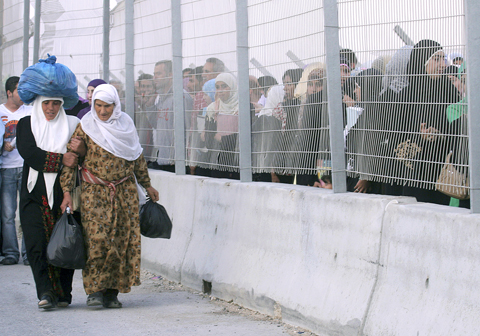The price of property in the West Bank is rocketing beyond the reach of most local businesses and homeseekers, pushed up by a weak US dollar and Israeli control of large chunks of the territory, a World Bank report published yesterday says.
The 41-page report cites local government data from the commercial and political center of Ramallah as saying the value of prime downtown commercial plots has doubled each year since 2005, hitting around US$4,000 per square meter at present.
Israel, citing the need to prevent Palestinian attacks inside Israel or on Jewish settlers in the West Bank, has placed large swaths of the Palestinian land and roads under its control off limits to Palestinians. It also maintains a complex network of checkpoints on roads that remain open to West Bankers.

PHOTO: AP
That leaves the vast majority of Palestinians chasing land in the remaining 41 percent of the territory, which is home to at least 90 percent of the population, the World Bank said.
“As a result, land prices are shooting up and in certain towns are becoming prohibitive for all but high value commercial activities, or high rise apartment buildings,” it said.
“Residential development is crowding out other economic activities on scarce plots available for development, yet there remains a housing shortage,” the report said.
The report does not cover the Gaza Strip, which Israel evacuated in 2005 and largely sealed off after the Islamic militant Hamas movement seized power there last year.
In addition to the Israeli squeeze on the West Bank, the World Bank said, property prices there are being nudged up by the many Palestinians living abroad and sending money home, some of it slated for investment.
“The real value of domestic cash savings, usually in US dollars or Jordanian dinars, are threatened by the falling dollar, creating pressure to convert these cash savings into stable investments,” the report said. “With few profitable options in the productive sectors, much capital is invested in land, putting added pressure on prices.”
The World Bank report concludes that little can be done to increase the stock of land available until the Israelis and Palestinians end their conflict.
“Ultimately, the restrictions on access to land [under Israeli control] will only be resolved with the final resolution of the peace process and the end of the occupation,” it said.
The renewal of Israeli-Palestinian peace talks at a US-hosted conference last November was supposed to have produced a final peace deal by the end of this year, but the sides have acknowledged that target is unreachable. With Israel in the throes of forming a new government and US presidential elections just around the corner, change seems unlikely anytime soon.

Nauru has started selling passports to fund climate action, but is so far struggling to attract new citizens to the low-lying, largely barren island in the Pacific Ocean. Nauru, one of the world’s smallest nations, has a novel plan to fund its fight against climate change by selling so-called “Golden Passports.” Selling for US$105,000 each, Nauru plans to drum up more than US$5 million in the first year of the “climate resilience citizenship” program. Almost six months after the scheme opened in February, Nauru has so far approved just six applications — covering two families and four individuals. Despite the slow start —

YELLOW SHIRTS: Many protesters were associated with pro-royalist groups that had previously supported the ouster of Paetongtarn’s father, Thaksin, in 2006 Protesters rallied on Saturday in the Thai capital to demand the resignation of court-suspended Thai Prime Minister Paetongtarn Shinawatra and in support of the armed forces following a violent border dispute with Cambodia that killed more than three dozen people and displaced more than 260,000. Gathered at Bangkok’s Victory Monument despite soaring temperatures, many sang patriotic songs and listened to speeches denouncing Paetongtarn and her father, former Thai prime minister Thaksin Shinawatra, and voiced their backing of the country’s army, which has always retained substantial power in the Southeast Asian country. Police said there were about 2,000 protesters by mid-afternoon, although

MOGAMI-CLASS FRIGATES: The deal is a ‘big step toward elevating national security cooperation with Australia, which is our special strategic partner,’ a Japanese official said Australia is to upgrade its navy with 11 Mogami-class frigates built by Japan’s Mitsubishi Heavy Industries, Australian Minister for Defence Richard Marles said yesterday. Billed as Japan’s biggest defense export deal since World War II, Australia is to pay US$6 billion over the next 10 years to acquire the fleet of stealth frigates. Australia is in the midst of a major military restructure, bolstering its navy with long-range firepower in an effort to deter China. It is striving to expand its fleet of major warships from 11 to 26 over the next decade. “This is clearly the biggest defense-industry agreement that has ever

DEADLY TASTE TEST: Erin Patterson tried to kill her estranged husband three times, police said in one of the major claims not heard during her initial trial Australia’s recently convicted mushroom murderer also tried to poison her husband with bolognese pasta and chicken korma curry, according to testimony aired yesterday after a suppression order lapsed. Home cook Erin Patterson was found guilty last month of murdering her husband’s parents and elderly aunt in 2023, lacing their beef Wellington lunch with lethal death cap mushrooms. A series of potentially damning allegations about Patterson’s behavior in the lead-up to the meal were withheld from the jury to give the mother-of-two a fair trial. Supreme Court Justice Christopher Beale yesterday rejected an application to keep these allegations secret. Patterson tried to kill her